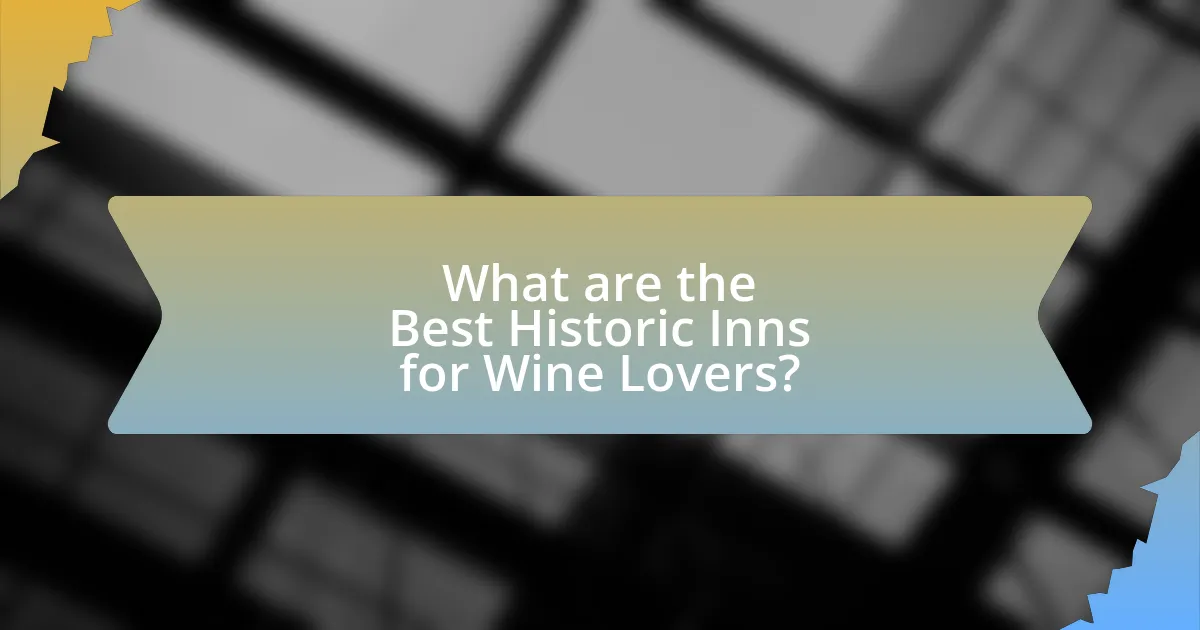The article focuses on the best historic inns for wine lovers, highlighting notable establishments such as The Inn at Little Washington in Virginia and The Wine Country Inn in Napa Valley. It explores how these inns enhance the wine tasting experience through unique atmospheres, curated wine selections, and exclusive events like vineyard tours and wine pairing dinners. Additionally, the article discusses the significance of location in wine tourism, the historical context of these inns, and practical tips for guests to maximize their wine tasting experiences. Overall, it serves as a guide for wine enthusiasts seeking immersive and enriching stays in historic settings.

What are the Best Historic Inns for Wine Lovers?
The best historic inns for wine lovers include The Inn at Little Washington in Virginia, which offers a curated wine list featuring over 1,300 selections, and The Wine Country Inn in Napa Valley, known for its extensive local wine offerings and vineyard views. These inns not only provide luxurious accommodations but also host wine tastings and pairings, enhancing the experience for guests. The Inn at Little Washington, established in 1978, has received numerous accolades, including a Michelin star, while The Wine Country Inn has been recognized for its commitment to local wines and hospitality, making them top choices for wine enthusiasts seeking a historic setting.
How do historic inns enhance the wine tasting experience?
Historic inns enhance the wine tasting experience by providing a unique atmosphere that combines history, charm, and local culture. The architectural features and historical significance of these inns often create an immersive environment that complements the tasting of regional wines. For instance, many historic inns are located in wine-producing regions, allowing guests to enjoy tastings that are directly linked to the local vineyards. Additionally, the inns often offer curated wine pairings with meals, enhancing the overall sensory experience. The combination of knowledgeable staff who can share stories about the wines and the region further enriches the tasting experience, making it not just about the wine itself but also about the context in which it is enjoyed.
What unique features do these inns offer for wine enthusiasts?
These inns offer unique features such as exclusive wine tastings, vineyard tours, and wine pairing dinners specifically designed for wine enthusiasts. For instance, many historic inns collaborate with local wineries to provide guests with private access to tastings and guided tours of vineyards, enhancing the overall experience. Additionally, some inns host special events like winemaker dinners, where guests can enjoy curated meals paired with selected wines, allowing for an immersive culinary experience. These offerings not only highlight the local wine culture but also create memorable experiences tailored to wine lovers.
How do the locations of these inns contribute to wine tourism?
The locations of these inns significantly enhance wine tourism by positioning them within or near renowned wine regions, allowing easy access to vineyards and wineries. Proximity to vineyards facilitates wine tasting experiences and vineyard tours, which are essential components of wine tourism. For instance, inns located in Napa Valley or Bordeaux provide guests with immediate access to some of the world’s most prestigious wineries, thereby attracting wine enthusiasts seeking immersive experiences. Additionally, these locations often feature scenic landscapes that enhance the overall appeal of wine tourism, as visitors are drawn to the aesthetic beauty of rolling vineyards and picturesque settings.
Why should wine lovers choose historic inns over modern accommodations?
Wine lovers should choose historic inns over modern accommodations because these inns often provide a unique blend of charm, character, and proximity to vineyards that enhance the wine-tasting experience. Historic inns frequently feature architecture and decor that reflect the local culture and history, creating an immersive environment that modern hotels lack. Additionally, many historic inns are located in wine regions, offering easy access to local wineries and personalized tasting tours, which can include exclusive pairings and insights from knowledgeable hosts. This combination of ambiance and accessibility makes historic inns a preferred choice for wine enthusiasts seeking a deeper connection to the wine culture.
What historical significance do these inns hold?
These inns hold historical significance as they often served as key gathering places for travelers and local communities, particularly during the development of wine regions. Many of these establishments date back to the 18th and 19th centuries, reflecting architectural styles and cultural practices of their time. For instance, inns like the historic Château de Pommard in Burgundy not only provide accommodations but also showcase the evolution of winemaking traditions and local heritage, contributing to the cultural landscape of wine tourism. Their preservation allows visitors to experience the historical context of wine production and hospitality, reinforcing the connection between the past and present in wine culture.
How does the ambiance of historic inns affect wine tasting?
The ambiance of historic inns significantly enhances the wine tasting experience by creating a unique atmosphere that engages the senses. The architectural charm, period decor, and historical context of these inns often evoke a sense of nostalgia and connection to the past, which can influence the perception of the wine being tasted. For instance, studies have shown that environmental factors, such as lighting and decor, can affect taste perception and enjoyment levels. A study published in the Journal of Sensory Studies found that participants rated wines more favorably in aesthetically pleasing environments. Therefore, the ambiance of historic inns not only complements the wine selection but also elevates the overall tasting experience through sensory engagement and emotional resonance.

What Types of Wine Tasting Tours are Available at Historic Inns?
Historic inns typically offer a variety of wine tasting tours, including guided vineyard tours, wine and food pairing experiences, and private tastings with winemakers. Guided vineyard tours allow guests to explore the wine production process while sampling wines directly from the source. Wine and food pairing experiences often feature local cuisine paired with specific wines, enhancing the tasting experience. Private tastings with winemakers provide an intimate setting for guests to learn about the wines and the winemaking process, often including exclusive access to limited-release wines. These offerings cater to wine enthusiasts looking for immersive experiences in a historic setting.
What are the different formats of wine tasting tours offered?
Wine tasting tours are offered in several formats, including guided group tours, private tastings, vineyard picnics, and virtual tastings. Guided group tours typically involve a set itinerary with a knowledgeable guide leading participants through multiple wineries, providing insights into the wine-making process. Private tastings allow for a more personalized experience, often tailored to individual preferences and conducted in a more intimate setting. Vineyard picnics combine wine tasting with outdoor dining, where guests can enjoy food pairings amidst the scenic vineyard landscape. Virtual tastings have gained popularity, especially during the pandemic, allowing participants to sample wines from home while engaging with winemakers or sommeliers online. These formats cater to diverse preferences and enhance the overall wine tasting experience.
How do guided tours differ from self-guided experiences?
Guided tours differ from self-guided experiences primarily in the level of structure and support provided. Guided tours offer a pre-planned itinerary led by a knowledgeable guide who shares insights, historical context, and curated information about the locations visited, enhancing the educational experience. In contrast, self-guided experiences allow individuals to explore at their own pace without a guide, relying on personal research or available resources like maps and audio guides. This difference in structure impacts the depth of information received; studies show that guided tours can increase retention of historical facts by up to 50% compared to self-guided methods, as participants engage more actively with the material presented by the guide.
What role do local wineries play in these tours?
Local wineries serve as key attractions in wine tasting tours, providing visitors with opportunities to sample a variety of wines and learn about the winemaking process. These wineries often offer guided tastings, vineyard tours, and educational sessions that enhance the overall experience for wine lovers. According to the California Wine Institute, wine tourism significantly contributes to local economies, with visitors spending an average of $1,000 per trip, which underscores the importance of wineries in attracting tourism and supporting local businesses.
How can guests participate in wine pairing events at these inns?
Guests can participate in wine pairing events at these inns by making reservations in advance, as these events often have limited seating. Many inns offer structured wine pairing dinners where guests can enjoy curated menus that complement specific wines. Additionally, guests may have the opportunity to engage with sommeliers or chefs during these events, enhancing their experience through guided tastings and discussions about the selected wines.
What types of cuisine are typically paired with local wines?
Local wines are typically paired with regional cuisines that complement their flavors. For example, Italian wines are often paired with pasta dishes, while French wines are matched with cheese and charcuterie. This pairing tradition is rooted in the concept of terroir, where the local environment influences both the wine and the food, enhancing the dining experience. Studies show that food and wine pairings can elevate flavors, making the combination of local wines with traditional dishes a common practice in wine regions worldwide.
How do chefs at these inns create unique pairing experiences?
Chefs at historic inns create unique pairing experiences by carefully selecting local ingredients and wines that complement each other. They often draw on regional culinary traditions and seasonal produce to craft dishes that enhance the flavors of the paired wines. For instance, a chef might pair a local seafood dish with a regional white wine, ensuring that the acidity and flavor profile of the wine elevate the dish’s taste. This approach not only highlights the quality of local products but also provides guests with a memorable dining experience that reflects the inn’s heritage and the surrounding area.

What Should Wine Lovers Look for When Choosing a Historic Inn?
Wine lovers should look for historic inns that offer curated wine experiences, including tastings and pairings with local cuisine. These inns often have partnerships with nearby wineries, providing guests access to exclusive tours and tastings. Additionally, the ambiance and historical significance of the inn can enhance the overall experience, as many historic inns are located in renowned wine regions. For example, inns in Napa Valley or Bordeaux not only provide comfortable accommodations but also immerse guests in the local wine culture, making the stay more enriching.
What amenities are essential for a great wine tasting stay?
Essential amenities for a great wine tasting stay include comfortable accommodations, access to a wine cellar or tasting room, knowledgeable staff for guided tastings, and options for food pairings. Comfortable accommodations ensure a relaxing experience, while a wine cellar or tasting room provides direct access to the wines being sampled. Knowledgeable staff enhance the experience by offering insights into the wines and the region, and food pairing options elevate the tasting experience by complementing the flavors of the wines. These amenities collectively contribute to a memorable and enjoyable wine tasting stay.
How important is the selection of wines available at the inn?
The selection of wines available at the inn is crucial for enhancing the overall guest experience. A diverse and high-quality wine selection can complement the culinary offerings, elevate the ambiance, and cater to the preferences of wine enthusiasts. Research indicates that establishments with well-curated wine lists often see increased customer satisfaction and repeat visits, as guests appreciate the opportunity to explore local and international wines that pair well with their meals. This importance is underscored by the fact that wine tourism is a significant driver of revenue in the hospitality industry, with many travelers specifically seeking out inns that offer exceptional wine experiences.
What additional experiences should be considered when booking?
When booking a stay at historic inns for wine lovers, consider additional experiences such as vineyard tours, wine tastings, and culinary pairings. These experiences enhance the overall visit by providing opportunities to explore local wine production, learn about the winemaking process, and enjoy food and wine pairings that highlight regional flavors. Research indicates that immersive experiences, like guided vineyard tours, can significantly enrich a guest’s understanding and appreciation of wine, making the stay more memorable.
How can guests ensure they have the best wine tasting experience?
Guests can ensure they have the best wine tasting experience by preparing in advance, which includes researching the wines being offered and understanding their personal preferences. Knowledge of the wine varieties enhances appreciation and enjoyment during the tasting. Additionally, guests should arrive with an open mind and a willingness to explore different flavors, as this can lead to discovering new favorites. Engaging with the staff for insights and recommendations can also enrich the experience, as they often provide valuable context about the wines and their origins. Studies show that informed tasters are more likely to enjoy and remember their experiences, making preparation key to a memorable wine tasting.
What tips can enhance the enjoyment of wine pairings?
To enhance the enjoyment of wine pairings, focus on matching the wine’s body and flavor profile with the food’s characteristics. For instance, a full-bodied red wine complements rich, fatty dishes, while a crisp white wine pairs well with lighter fare like seafood or salads. Additionally, consider the acidity of the wine; high-acid wines can balance fatty foods, creating a harmonious experience. Research indicates that the right pairings can elevate the overall dining experience, as flavors interact and enhance each other, leading to a more enjoyable meal.
How can guests prepare for a wine tasting tour at a historic inn?
Guests can prepare for a wine tasting tour at a historic inn by researching the specific wines offered and understanding the tasting process. Familiarizing themselves with the types of wines produced in the region enhances the experience, as many historic inns are located near vineyards known for particular varietals. Additionally, guests should consider making reservations in advance, as tours can fill up quickly, especially during peak seasons. Dressing appropriately for the occasion, including comfortable shoes for walking and layers for changing weather, is also advisable. Lastly, guests should plan to arrive with an appetite, as many tastings are paired with local cheeses or charcuterie, which can enrich the overall tasting experience.
What are the top recommendations for historic inns catering to wine lovers?
The top recommendations for historic inns catering to wine lovers include the Inn at Little Washington in Virginia, which offers a renowned wine cellar with over 14,000 bottles, and the Chateau Chantal Winery & Inn in Michigan, known for its stunning vineyard views and wine tasting experiences. Additionally, the Wine Country Inn in Napa Valley provides guests with access to exclusive wine tours and tastings, enhancing the wine lover’s experience. Each of these inns combines historic charm with exceptional wine offerings, making them ideal destinations for enthusiasts.
Which inns are known for their exceptional wine tasting tours?
The inns known for their exceptional wine tasting tours include the Inn at Little Washington in Virginia, which offers curated wine experiences paired with gourmet dining, and the Wine Country Inn in Napa Valley, renowned for its extensive selection of local wines and vineyard tours. These inns provide immersive experiences that highlight regional wines, enhancing the overall tasting journey for guests.
What unique features set these recommended inns apart?
The recommended inns for wine lovers are distinguished by their historic charm, personalized wine tasting experiences, and proximity to renowned vineyards. Each inn offers unique architectural features that reflect their historical significance, such as original woodwork and period furnishings. Additionally, they provide curated wine pairing dinners and exclusive access to local wineries, enhancing the overall experience for guests. These inns often host wine education sessions led by sommeliers, allowing guests to deepen their knowledge of wine.
What practical tips can enhance your wine tasting experience at historic inns?
To enhance your wine tasting experience at historic inns, consider scheduling tastings during off-peak hours to avoid crowds, allowing for a more personalized experience. Engaging with knowledgeable staff can provide insights into the history of the wines and the inn itself, enriching your understanding and appreciation. Additionally, pairing local cuisine with the wines can elevate the tasting experience, as many historic inns offer unique regional dishes that complement their wine selections. Researching the specific wines offered at the inn beforehand can also help you make informed choices and ask relevant questions during the tasting.